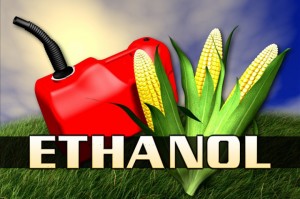Between the views of the winner of the election, and the views of one of our recent guest speakers in class, Mike Mann, I have been confronted with some very conflicting perspectives on climate change. I, like Mike Mann, believe that it exists, is aided by human actions, and is an extremely troublesome issue. There are several different areas in which people think we could change the way we do things, to be less harmful to the environment. One of ideas which has been tossed around to do that is converting our method for powering vehicles from gasoline to ethanol, or at least making ethanol a more substantial part of the mixture which powers cars. Would this switch have a positive impact on the environment?
change the way we do things, to be less harmful to the environment. One of ideas which has been tossed around to do that is converting our method for powering vehicles from gasoline to ethanol, or at least making ethanol a more substantial part of the mixture which powers cars. Would this switch have a positive impact on the environment?
To properly examine this question, we must first define what ethanol is. Ethanol is a biomass-fuel produced by biomass. Biomass can include: corn, sugarcane, grass, garbage, or other organic materials. Over the past several years it has been slowly integrated into the fuels of standard. Currently, the average amount of ethanol in regular gasoline is 10%. So it does not account for too much of the overall constitution of standard fuel. There are several ways which this fuel can be assessed to determine its how environmentally friendly ethanol is. Specifically, I am going to examine its effect on air quality emissions, effect on water quality, efficiency of production.
One can measure the way in which ethanol pollutes the air in two ways; emissions during  production, and emissions caused from burning the fuel. Currently, we are at a point where the production emissions are higher than that of gasoline. However, the emissions coming from burned ethanol are less harmful than those of burned gasoline. It is a bit of a mixed basket.
production, and emissions caused from burning the fuel. Currently, we are at a point where the production emissions are higher than that of gasoline. However, the emissions coming from burned ethanol are less harmful than those of burned gasoline. It is a bit of a mixed basket.
The effect of ethanol on water quality comes from its production. If the crop used to make the ethanol requires large amounts of fertilizer and pesticides, then more of that substance will be exposed to the environment. Amounts of these substances will find their way into water runoff and groundwater, which can contaminate larger water supplies.
There are two ways in which ethanol is produced, via food matter, and non-food matter. How it gets from seed to being used, it called life-cycle emission, and this affects its environmental impact. The life cycle emissions vary from source of production. Having ethanol produced from a non-food source, it more efficient and has lower life-cycle emissions than that produced from food matter. Despite that, the primary way we produce ethanol is via food matter. While it is renewable, unlike traditional fossil fuels, producing ethanol from a food crop like corn is very demanding in terms of amount of land needed, as well as water needed. It does not have a good energy balance; the amount of fossil fuel energy needed for production is more than that which the fuel provides. Therefore, recycling non-food organic matter is superior, because it doesn’t have that same environmental drain, and has a better energy balance.
It is hard to have a definitive conclusion on whether or not switching cars to a fuel with a higher concentration of ethanol will positively impact the environment. There are a lot of factors influencing how green ethanol really is. The largest environmental problem with ethanol, is its production. In order to make ethanol a viable alternative its production needs to become less demanding of land, water, and fuel. All of those problems however are solvable, with the developing technologies and enhanced methods of production which are being developed. I would conclude that in the long run ethanol will be an environmentally friendly option for fueling vehicles, but we are not there yet. Once that point is reached, I think that transitioning cars to ethanol will have a positive effect on the environment. The biggest roadblock I think will be the same ones which we discussed in class which are affecting policies regarding green energy now, politicians who are supporting the fossil fuel industry.
Picture Links:
